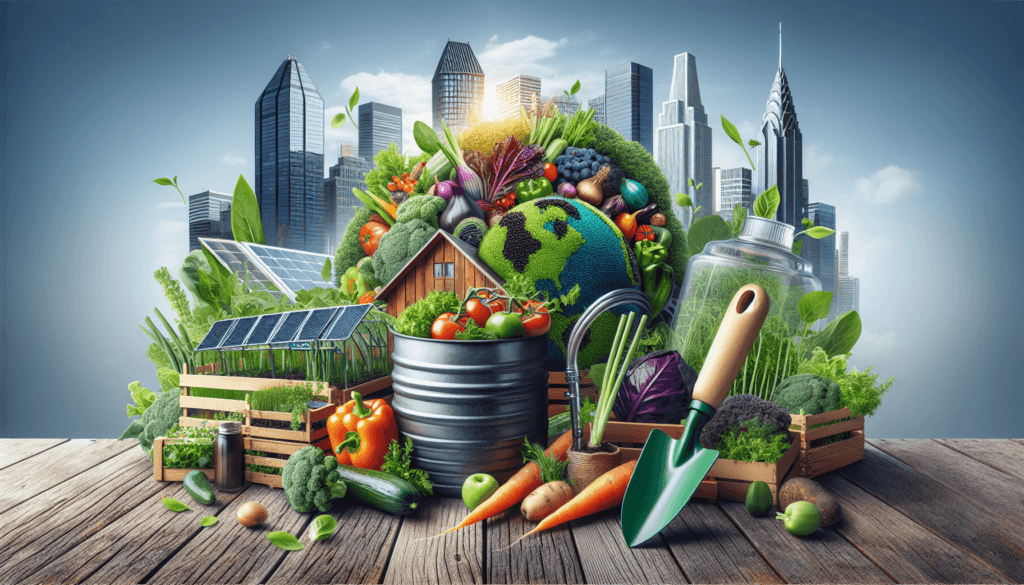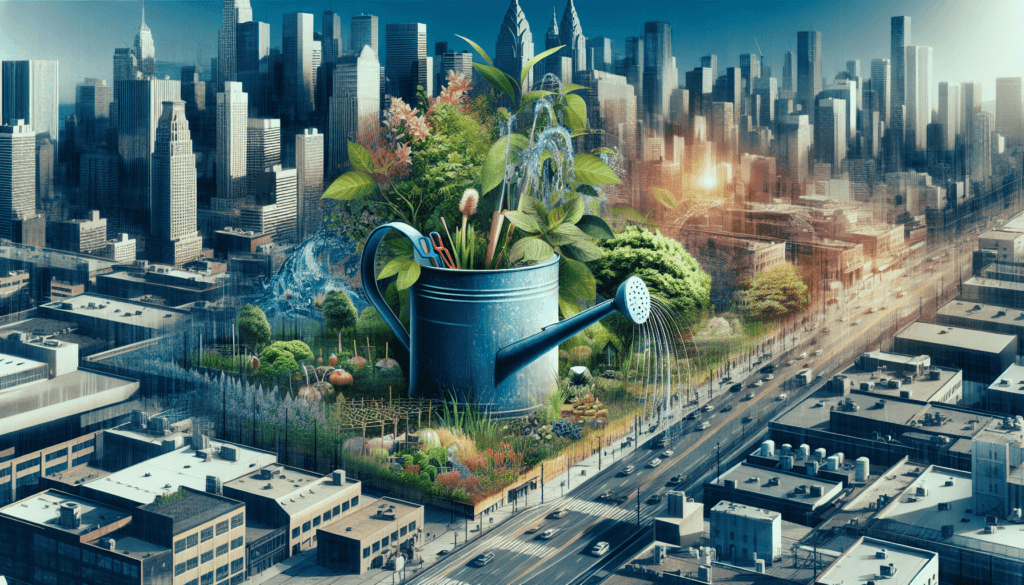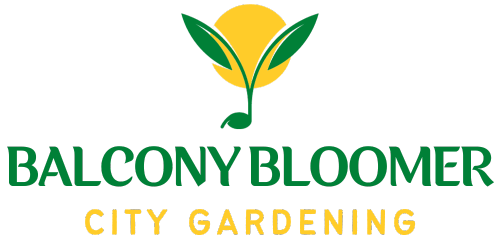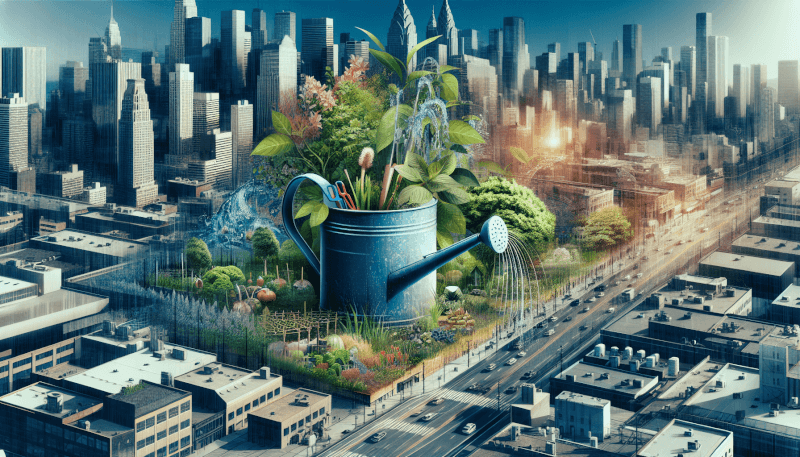Imagine a bustling city, filled with skyscrapers and crowded streets. Now imagine pockets of green oasis scattered throughout, where vegetables and flowers bloom, birds chirp, and people gather to cultivate their own little piece of nature. Urban gardening offers a solution to the challenges of sustainable urban development, providing opportunities for community engagement, food production, and environmental conservation. In this article, we will explore the benefits of urban gardening and how it can contribute to creating more livable and sustainable cities for all.

Benefits of Urban Gardening
Improves Air Quality
Urban gardening plays a crucial role in improving the air quality in urban areas. As plants and trees absorb carbon dioxide (CO2) during photosynthesis and release oxygen, they help to reduce the levels of CO2 in the air, thus improving its quality. By increasing the number of green spaces through urban gardening, the overall air quality is enhanced, making the environment healthier for everyone.
Reduces Urban Heat Island Effect
The phenomenon of the urban heat island effect, where cities experience higher temperatures compared to the surrounding rural areas, can be mitigated by urban gardening. The presence of plants and trees in urban gardens helps to cool down the surroundings through shading and evapotranspiration, reducing the overall temperature and creating a more comfortable living environment.
Enhances Biodiversity
Urban gardening contributes to the enhancement of biodiversity within urban areas. By cultivating a variety of plant species in gardens and green spaces, it creates habitats for insects, birds, and other wildlife, which in turn improves the overall biodiversity of the area. This increase in biodiversity helps to create a more balanced and resilient ecosystem, providing benefits to the environment and the community.
Promotes Food Security
One of the most significant benefits of urban gardening is its ability to promote food security. By growing fruits, vegetables, and herbs in urban gardens, people have access to fresh and nutritious food right in their own neighborhoods. This reduces reliance on food imports and increases local food production, ultimately enhancing food security for the community. Urban gardening also allows for the cultivation of culturally relevant and traditional foods, fostering a sense of cultural preservation and diversity.
Community Engagement and Social Cohesion
Brings People Together
Urban gardening acts as a catalyst for bringing people together and building strong communities. Shared gardening spaces, such as community gardens or allotment plots, provide a platform for individuals from different backgrounds to come together, share knowledge, and work towards a common goal. Gardening activities create opportunities for social interaction and collaboration, fostering a sense of belonging and community pride.
Stimulates Social Interactions
Engaging in urban gardening activities encourages social interactions among community members. Whether it’s exchanging gardening tips, sharing resources, or participating in group projects, gardening provides a natural setting for people to connect and engage with one another. These social interactions help to strengthen social networks, improve social support, and create a sense of camaraderie among community members.
Fosters a Sense of Belonging
Urban gardening instills a sense of belonging within communities. When individuals actively participate and contribute to the development and maintenance of urban gardens, they feel a sense of ownership and pride in their work. This sense of belonging fosters stronger community bonds and promotes a shared responsibility for the well-being of the neighborhood. Urban gardening can create a space where everyone is welcome, regardless of age, background, or social status, promoting inclusivity and solidarity.
Economic Benefits
Job Creation
Urban gardening can stimulate job creation and economic opportunities within communities. As urban gardens and related initiatives expand, there is a need for skilled gardeners, educators, and maintenance personnel. Additionally, urban gardening can spawn entrepreneurial ventures, such as urban farming businesses, local produce markets, and eco-tourism activities. These opportunities contribute to the local economy, generate employment, and improve overall economic resilience.
Local Economic Boost
The existence of thriving urban gardens can provide a significant boost to the local economy. When community members purchase locally grown produce, it supports local farmers and gardeners. Moreover, the establishment of farmers’ markets and farm-to-table initiatives promotes the circulation of money within the community, stimulating growth and economic development. By supporting local businesses and encouraging local production, urban gardening contributes to a more sustainable and self-reliant economy.
Improves Property Values
The presence of urban gardens and green spaces has been shown to enhance property values. Properties located in close proximity to well-maintained urban gardens often experience an increase in their market value. The aesthetic appeal, improved air quality, and community development associated with urban gardening all contribute to the desirability of living in these neighborhoods. Thus, investing in urban gardening initiatives can not only benefit individuals but also provide a positive economic impact on the entire community.
Environmental Sustainability
Reduces Carbon Footprint
Urban gardening plays a crucial role in reducing the carbon footprint of cities. By absorbing carbon dioxide during photosynthesis, plants help to mitigate the greenhouse effect and combat climate change. Additionally, urban gardens can serve as carbon sinks, storing carbon in the soil and vegetation. By expanding urban gardening initiatives, cities can significantly contribute to global efforts to reduce greenhouse gas emissions and improve environmental sustainability.
Mitigates Stormwater Runoff
Urban gardening helps to mitigate the negative effects of stormwater runoff in urban areas. Hard surfaces, such as roads and buildings, prevent rainwater from being absorbed into the ground, leading to increased runoff and the potential for flooding and water pollution. However, the presence of urban gardens and green spaces allows for natural water absorption and filtration. The soil and vegetation help to retain water, reducing the strain on drainage systems and improving overall water management.
Conserves Water Resources
Urban gardening promotes the efficient use of water resources. Through practices such as rainwater harvesting, drip irrigation systems, and water-wise planting techniques, urban gardens minimize water wastage. By implementing sustainable water management strategies, urban gardening helps to conserve water, especially in regions facing water scarcity or drought conditions. This conservation not only benefits the environment but also promotes responsible water usage within communities.

Health and Well-being
Access to Fresh and Nutritious Food
Urban gardening provides communities with a direct source of fresh, locally grown, and nutritious food. By growing fruits, vegetables, and herbs in urban gardens, individuals have access to a diverse range of produce that is free from harmful chemicals and pesticides. This access to healthy food contributes to improved nutrition, better overall health, and reduced risk of diet-related diseases, such as obesity and diabetes.
Physical Activity and Exercise
Engaging in urban gardening activities promotes physical activity and exercise. From digging and planting to watering and weeding, gardening involves various physical movements that contribute to muscle strength, flexibility, and cardiovascular health. Regular physical activity associated with gardening helps individuals maintain a healthy weight, reduce the risk of chronic diseases, and improve overall fitness levels. Moreover, gardening provides an enjoyable and accessible way for people of all ages and abilities to stay active and in touch with nature.
Mental Health Benefits
Urban gardening has been recognized for its positive impact on mental health and well-being. The act of gardening has been found to reduce stress levels, alleviate symptoms of depression and anxiety, and improve overall mental well-being. The connection with nature, the sense of accomplishment from growing plants, and the therapeutic benefits of being outdoors contribute to a positive mental state. Urban gardening also provides opportunities for social interaction and a sense of purpose, further enhancing mental health and community resilience.
Addressing Food Deserts and Food Insecurity
Increased Access to Healthy Food
Urban gardening directly addresses the issue of limited access to healthy food in underserved areas commonly referred to as food deserts. By cultivating fresh produce within these communities, urban gardens provide a local and affordable source of nutritious food. This increased accessibility reduces the reliance on processed and unhealthy options, improving the overall diet and health of residents.
Alleviation of Food Insecurity
Food insecurity, the limited or uncertain access to adequate food, is a significant challenge in many urban areas. Urban gardening plays a crucial role in alleviating food insecurity by providing a sustainable and locally sourced food supply. By empowering communities to grow their own food and fostering self-sufficiency, urban gardening initiatives contribute to a more resilient and food-secure future for all.
Reduction in Food Deserts
Urban gardening helps to reduce the prevalence of food deserts, which are areas with limited access to affordable and nutritious food. By establishing community gardens or rooftop gardens in these areas, urban gardening provides a solution to the lack of fresh produce. The availability of locally grown food in food deserts promotes equity and social justice, ensuring that all individuals have access to quality food and the opportunity to make healthy choices.

Utilization of Underutilized Urban Spaces
Rooftop Gardening
One innovative way to utilize underutilized urban spaces is through rooftop gardening. By transforming rooftops into productive green spaces, urban gardening takes advantage of previously unused areas and brings numerous benefits. Rooftop gardens can improve energy efficiency by providing insulation, reduce stormwater runoff, and enhance biodiversity. They also create opportunities for urban farming, herb cultivation, and even small-scale food production in densely populated areas.
Vertical Gardening
Vertical gardening is another effective technique for utilizing underutilized urban spaces. By growing plants vertically, such as on walls or trellises, vertical gardens optimize space and maximize productivity. This method is particularly useful in areas with limited ground space, making it possible to cultivate a wide range of plants in urban environments. Vertical gardens enhance aesthetics, improve air quality, and provide a sustainable solution for growing food or ornamental plants in areas with spatial constraints.
Empty Lot Transformation
Urban gardening offers the opportunity to transform vacant and unused lots into vibrant green spaces. By converting these underutilized areas into community gardens or urban farms, urban gardening revitalizes the neighborhood, eliminates blight, and improves the overall aesthetics of the area. Empty lot transformation through urban gardening also provides opportunities for local food production, educational programs, and community engagement, creating a positive impact on both the environment and the surrounding community.
Educational Opportunities
Hands-on Learning
Urban gardening provides valuable hands-on learning opportunities for individuals of all ages. Through practical gardening activities, people can gain knowledge and skills in various aspects of horticulture, such as planting, soil management, and pest control. This experiential learning method promotes environmental awareness, encourages curiosity, and fosters a deeper understanding of ecological processes. Urban gardens also offer a platform for intergenerational learning, where older generations can pass down traditional gardening knowledge to younger generations.
Environmental Education
By incorporating urban gardening into educational curricula, schools and educational institutions can provide meaningful environmental education. Urban gardens serve as outdoor classrooms where students can learn about sustainable agriculture, ecology, and the importance of biodiversity. Environmental education through urban gardening cultivates a sense of environmental stewardship, empowering students to become active participants in creating a greener and more sustainable future.
Agricultural Skills Development
Urban gardening presents an opportunity for individuals to develop valuable agricultural skills. Through vocational training programs or apprenticeships, aspiring farmers and gardeners can gain practical experience in urban agriculture. These skills can lead to employment opportunities in the agricultural sector and contribute to the development of a skilled workforce. Moreover, agricultural skills development promotes self-sufficiency, food security, and the cultivation of sustainable farming practices within urban communities.

Resilience and Adaptation to Climate Change
Green Infrastructure
Urban gardening plays a crucial role in green infrastructure development. By incorporating green spaces, such as urban gardens and parks, into the built environment, cities can enhance their resilience and adapt to climate change. Urban gardens act as urban heat sinks during heatwaves, absorbing excess heat and reducing urban temperatures. The presence of vegetation also helps to mitigate the impacts of extreme weather events, such as heavy rain or strong winds. Green infrastructure contributes to the overall resilience of cities and improves the quality of life for urban dwellers.
Improved Urban Water Management
Urban gardening contributes to improved urban water management by reducing stormwater runoff and increasing water retention. The soil and vegetation in urban gardens act as natural filters, preventing pollutants from entering water bodies and reducing the burden on drainage systems. Additionally, by implementing water-saving practices, such as rainwater harvesting and drip irrigation, urban gardens help to conserve water resources. Improved urban water management through urban gardening ensures the availability of clean water and promotes sustainable water usage within cities.
Heat Mitigation
The presence of urban gardens and green spaces helps to mitigate the adverse effects of urban heat. By shading buildings and paved surfaces, urban gardens provide relief from excessive heat and reduce energy consumption for cooling. The evapotranspiration process, where plants release water vapor into the air, further helps to cool the surrounding environment. The heat mitigation properties of urban gardening contribute to creating more comfortable and livable cities, particularly during hot summer months.
Policy and Planning Considerations
Zoning and Land-use Policies
To promote and facilitate urban gardening, cities need to review and adjust zoning and land-use policies. This may involve designating areas for community gardens, allotment plots, or urban farms within urban planning regulations. Ensuring that these spaces are protected and appropriately allocated can provide long-term support for urban gardening initiatives. By including urban gardening in zoning and land-use policies, cities demonstrate their commitment to sustainable urban development and food security.
Incorporation into Urban Planning Strategies
Urban gardening should be integrated into urban planning strategies, taking into consideration the needs and preferences of the community. By involving residents and stakeholders in the planning process, cities can identify suitable locations for urban gardens and prioritize their development. Integration into urban planning strategies ensures that urban gardening initiatives align with broader goals, such as improving public health, enhancing biodiversity, and creating resilient and sustainable cities.
Community Gardens Regulation
To ensure the success and longevity of community gardens, appropriate regulations and guidelines need to be in place. These regulations may address issues such as land tenure, water access, composting, and garden maintenance. Clear guidelines and policies provide a framework for community members and garden organizers, ensuring fairness, accountability, and sustainability. By establishing regulations for community gardens, cities can support community-led initiatives and create a conducive environment for urban gardening to flourish.
In conclusion, urban gardening offers numerous benefits that contribute to sustainable urban development. From improving air quality and reducing the urban heat island effect to promoting social cohesion and enhancing biodiversity, urban gardening has the potential to transform cities into healthier, more resilient, and sustainable environments. By recognizing and harnessing the potential of urban gardening, we can create communities that are not only vibrant and inclusive, but also able to adapt and thrive in the face of global challenges such as climate change and food insecurity. Investing in urban gardening is investing in the well-being and future of our cities and its residents.



